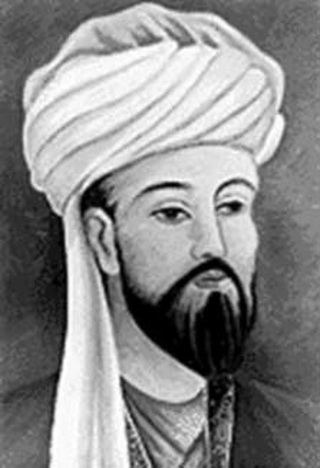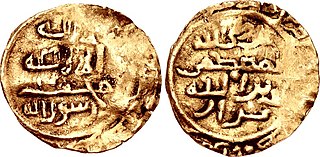
Alamut is a ruined mountain fortress located in the Alamut region in the South Caspian province of Qazvin near the Masoudabad region in Iran, approximately 200 km (130 mi) from present-day Tehran.

The Nizaris are the largest segment of the Ismaili Muslims, who are the second-largest branch of Shia Islam after the Twelvers. Nizari teachings emphasize independent reasoning or ijtihad; pluralism—the acceptance of racial, ethnic, cultural and inter-religious differences; and social justice. Nizaris, along with Twelvers, adhere to the Jaʽfari school of jurisprudence. The Aga Khan, currently Aga Khan IV, is the spiritual leader and Imam of the Nizaris. The global seat of the Ismaili Imamate is in Lisbon, Portugal.
Al-Mustansir, more fully al-Mustansir billah, is a Muslim regnal surname and may refer to:
Al-Qiyama or Al-Qiyamah, meaning "The Resurrection", or "The Rising of the Dead", is the seventy-fifth chapter (sūrah) of the Quran, with 40 verses (ayah).
Old Man of the Mountain is a former rock formation and New Hampshire landmark.
In Shia Islam, Qāʾim Āl Muḥammad is an epithet for the Mahdi, the eschatological figure in Islam who is widely believed to restore the religion and justice in the end of time. The term was used as early as the eighth century to refer to a future member of the family of the Islamic prophet Muḥammad who would rise against tyranny in the end of time and restore justice. This term was already common by the end of the Umayyad caliphate and largely replaced the term Mahdi in Shia literature. The term was often qualified as al-Qa'im bi 'l-sayf or al-Qa'im bi-amr Allah.

Rashid al-Din Sinan also known as the Old Man of the Mountain, was a da'i (missionary) and leader of the Syrian branch of the Nizari Isma'ili state from 1162 until his death in 1193. He was also a prominent figure in the history of the Crusades.
Momin or Mumin is an Arabic Islamic term, frequently referenced in the Quran, meaning "believer", and may refer to:
Judgment of God may refer to:
Ala al-Din Muhammad may refer to:

The Imamate in Nizari Isma'ili doctrine is a concept in Nizari Isma'ilism which defines the political, religious and spiritual dimensions of authority concerning Islamic leadership over the nation of believers. The primary function of the Imamate is to establish an institution between an Imam who is present and living in the world and his following whereby each are granted rights and responsibilities.

Ḥasan ʿAlā Zikrihi's-Salām or Hassan II was the hereditary Imam of the Nizari Isma'ilis of the Alamut Period from 1162 until 1166. From his capital of Alamut he ruled parts of Persia and Syria. His chief subordinate in Syria was Rashid ad-Din Sinan, the Old Man of the Mountain.

Nūr al-Dīn Muhammad II or ‘A'lā’ Muhammad was the Nizari Isma'ili Imām of Alamūt who reigned the longest period out of any lord (Khudawand) of Alamut, forty-four years. He affirmed the policies of his father, Hassan Ala Dhikrihi's Salam, who had been stabbed to death a year after proclaiming Qiyāma, or Resurrection.
In Nizārī Ismāʿīlism, the qiyāma was ceremoniously proclaimed at the mountain fortress of Alamūt in 1164 CE by the Nizārī imām Ḥasan ʿAlā Dhikrihi al-Salām. According to standard narratives of Islamic eschatology, the Yawm al-Qiyāmah is to take place at the end of time, at which point people will be called to account for their actions, and then be rewarded or punished accordingly. The Nizārī proclamation of qiyāma, however, is distinct in that it takes place within history, and, as such, assumes a special significance.
Isma'ilism is a branch or sub-sect of Shia Islam.

In Islam, "the promise and threat" of Judgment Day, when "all bodies will be resurrected" from the dead, and "all persons" are "called to account" for their deeds and their faith during their life on earth. It has been called "the dominant message" of the holy book of Islam, the Quran, and resurrection and judgement the two themes "central to the understanding of Islamic eschatology". Judgement Day is considered a fundamental tenet of faith by all Muslims, and one of the six articles of Islamic faith.
Khalil Allah or Khalilullah is an Arabic name, usually associated with Abraham. It can also refer to:
This page is based on this
Wikipedia article Text is available under the
CC BY-SA 4.0 license; additional terms may apply.
Images, videos and audio are available under their respective licenses.




